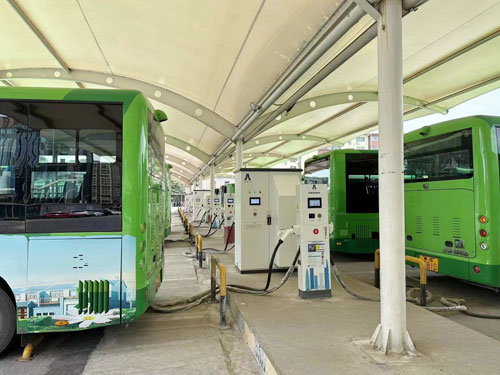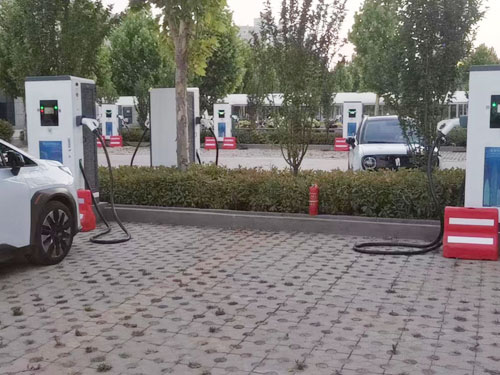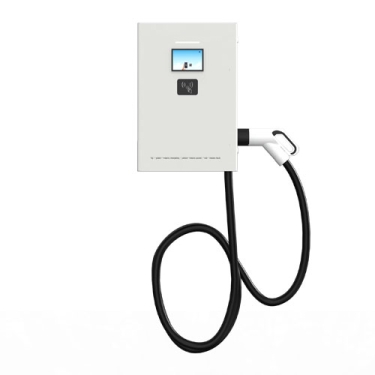- Visitors:0 Views
- Time:2023-12-29
electric vehicle charging station standards
Electric vehicle charging station standards mainly include the following aspects:
1. Equipment requirements: Electric vehicle chargers should comply with relevant national standards and regulations, and be safe, reliable, and efficient.
2. Charging interface: Electric vehicle chargers should have a variety of charging interfaces to meet the charging needs of different models. At the same time, the charging interface should have safety functions such as preventing misinsertion and leakage.
3. Charging protocol: Electric vehicle chargers should support multiple charging protocols, such as fast charging protocols, slow charging protocols, etc., to adapt to the charging needs of different users.
4. Communication protocol: Electric vehicle chargers should support multiple communication protocols, such as CAN bus, RS485, etc., to facilitate communication and control with electric vehicles.
5. Payment methods: Electric vehicle chargers should support multiple payment methods, such as card swiping, QR code scanning, etc., to facilitate users’ charging and payment operations.
6. Data collection and monitoring: Electric vehicle chargers should have data collection and monitoring functions to monitor and manage the charging process in real time.
7. Requirements for the construction of electric vehicle charging stations: The construction of electric vehicle charging stations should comply with urban planning and environmental protection requirements, and should be safe, reliable, and convenient.
8. After-sales service: Electric vehicle charger suppliers should provide comprehensive after-sales services, including equipment maintenance, replacement, technical support, etc.

In actual operation, the following points need to be paid attention to when constructing and using electric vehicle charging stations:
1. Site selection: Choose appropriate locations to build electric vehicle charging stations, such as shopping malls, parking lots, residential areas, etc., to provide users with convenient charging services.
2. Installation: Install electric vehicle charging stations in accordance with relevant standards and regulations to ensure that the equipment is safe, reliable and beautiful.
3. Debugging and testing: After the installation is completed, the electric vehicle charger should be debugged and tested to ensure that the equipment operates normally and meets relevant standards.
4. Use: Users should pay attention to safety when using electric vehicle chargers and follow the operating instructions for charging and payment operations.
5. Maintenance and management: Regularly inspect and maintain the electric vehicle charger to ensure normal operation of the equipment and extend its service life. At the same time, electric vehicle chargers are managed and monitored to ensure user safety and normal use.

If you want to know more about "electric vehicle charging station standards", you can consult us online or by email (sales@hjlcharger.com).
Recommended Reading
- 2023 National Day Holiday Notice2023-09-25
Hongjiali New Energy National
- Notice on the Qingming Festival holiday in 20242024-03-26
The Tomb-Sweeping Day is appro
- 2024 Mid-Autumn Festival Holiday Notice2024-09-14
2024 Mid-Autumn Festival Holiday NoticeThe bright ...
- electric vehicle charging stations uk2024-11-11
The construction and development of electric vehic...
- virginia ev charging stations2024-01-09
Hongjiali New Energy Co., Ltd.
- ev charger in china2024-04-25
For ev chargers in China, look
- ac vs dc ev charging2024-01-08
ac vs dc ev charging are what
- how long does it take to charge an electric car at...2025-01-09
How long does it take to charge an electric car at...
- electric car charging units2023-11-27
An electric car charging units
Hot Products
-
DC 20KW wallbox Chargring...
ParametersRequirementsGeneral Requiremen
Get last price
-
44kw ac charger
The 44KW AC charger is a charging device
Get last price
-
electric car charging sta...
Electric car charging station 22kw ev charger refers to elec...
Get last price
-
DC Sweep code portable 20...
ParametersRequirementsGeneral Requiremen
Get last price



